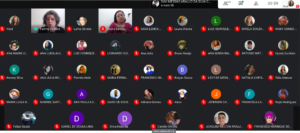News . Best Practices Multi-actor dialogue engaging students and health/science professionals for pregnancy prevention and physical/ mental violence awareness (Best Practice Brazil)

This best practice reports an open schooling activity with an open scenario developed by the NGO Anjos Digitais during the pandemic period. The activity was carried out in two public state schools in the municipality of Monsenhor Tabosa – a semi-arid region located in the state of Ceará – Brazil. It was supported by the Open University OU-UK.
Care: The socio-scientific issue that the students ‘care about‘ was pregnancy at puberty and violence. Data during the pandemic shows that violence during outbreak increased particularly against women and underrepresented groups.
Know: To help young people be more informed during their puberty with ‘knowledge’’, their online debate was supported by a dialogue focused on students questions, some references shared by experts on the web and informed-based recommendations developed by the participants.
Do: 300 students interacted with five science professionals, a specialist in menstrual education, a doctor, a psychologist, a nurse and a social worker. The science action focused on an interactive dialogue with inquiry mapping to bring up questions, references and comments in the online discussion using Google Meet platform.
Findings: The key benefit of open schooling mentioned by students was that the multi-actor dialogue led to greater awareness of teen pregnancy prevention and the forms of physical and mental violence that affect puberty. This initiative had the consent of the parents and created opportunities for dialogue between students and their family. Although this open schooling activity was not integrated into the curriculum, it was supported by teachers.
Outcome: Youth found the dialogue with professionals useful and listen to what other student think enabled them to increase their interest about the topic.
Find out more here: Our report.